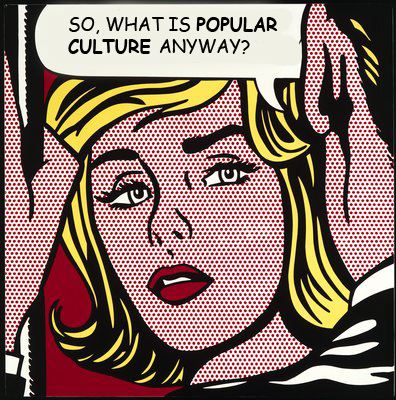4 May, 2006
Popular Culture: Summary Lecture
Popular Culture: Summary Lecture
Anders Fagerjord
Dept of Media and Communication
Popular Culture?

If your best friend asked you this, what would you respond? Discuss with your neighbor.
Popular Culture?
- Aesthetics: That which is not art
- "Low culture"
- Low-brow
- Kitsch: the well-known effect
- Mass culture
- Class: That of the working class or middle class
- Economy: Products of the cultural industry
- Statistics: What most people enjoy
Benjamin on Popular Culture
- Mass reproduced
- Working class
- Cultural commodities
- Loss of aura
- Film is the perfect modern medium
- Film could liberate the masses
- Mass culture is used to maintain power relations
Is popular culture any good?
Benjamin: It could be liberating, but is not good enough.
Adorno on Popular Culture
- Popular culture is the product of the culture industry
- They are mass-produced commodities, designed to pacify the worker in his leisure time
- They create a need for more of the same
- The culture industry maintains the capitalist power structure
Is popular culture any good?
Benjamin: It could be liberating, but is not good enough.
Adorno: No! It keeps the masses repressed!
Barthes on Popular Culture
- The culture of the French petty bourgoise
- A pattern of tastes
- Presents itself as natural, given, without history
- Uses a mythical structure of connotations

Is popular culture any good?
Benjamin: It could be liberating, but is not good enough.
Adorno: No! It keeps the masses repressed!
Barthes: No. It has some qualities, but tends to mask reality
Bourdieu on Popular Culture
- Popular culture is a pattern of taste, among several others
- Taste patterns are used to define identities
- Popular culture is a pattern less popular among those in power, and thus often contested
- Popular culture is for those of less
- economic capital
- cultural capital
Is popular culture any good?
Benjamin: It could be liberating, but is not good enough.
Adorno: No! It keeps the masses repressed!
Barthes: No. It has some qualities, but tends to mask reality
Bourdieu: The question is wrong. You should ask for who is popular culture good?
Huyssen on Popular Culture
- Popular culture is defined in contrast to Art
- Art has become difficult: people do not understand Art. Modernism led to a Great Divide
- Postmodernism attempts to bridge this divide (well, some postmodernists, anyway...)
- Postmodernism is not the first current to use popular cultural forms to make Art
- Dada
- Surrealism
- Russian avant-garde
- Pop Art
- These are political movements
- Art is most typically expressed in Modernism, which is apolitical
- Art should be more critical, more political
- Popular culture has meaning and value for those who understand it
Is popular culture any good?
Benjamin: It could be liberating, but is not good enough.
Adorno: No! It keeps the masses repressed!
Barthes: No. It has some qualities, but tends to mask reality
Bourdieu: The question is wrong. You should ask for who is popular culture good?
Huyssen:It is okay. But people should enjoy more art, and art and popular culture should be more critical
Is popular culture any good?
What do you think?Popular Culture?
If popular culture is defined as that which is not high art, and
if high art is marginalized today,
is the concept of popular culture meaningful anymore?
Exam: Getting it
The exam text will be available at the reception desk at the Department of Media and Communication Tuesday, 30 May, 10 a.m..
You can also find it on the Web shortly after. See the course's semester pages.
"Consolation session": Anders will answer questions from 10.15 to 11 a.m. in room 205, IMK.
Exam: Writing it
- Max 10 pages
- One page is 2300 characters without spaces.
- Front page and references are not counted.
Exam: Handing it in
Exams may be handed in at the Department of Media and Communication Thursday, 2 June, from 12 noon to 2 p.m..
- Two copies
- One staple in the corner (no binder)
- On cover:
- MEVIT 2110 Popular Culture, spring 2006.
- Candidate number
- Exam question
- No name!
- Print and sign cheating statement in advance
- Pageinate (and put candidate number on every page)
Afterwards
- Grades will be displayed on the walls at floors 2 and 4, Dept. of Media and Communication on 23 June
- No grades on phone or e-mail
- Remember your candidate number
- Course evaluation on Web, invitation in e-mail
- Questions: studiekonsulent@media.uio.no